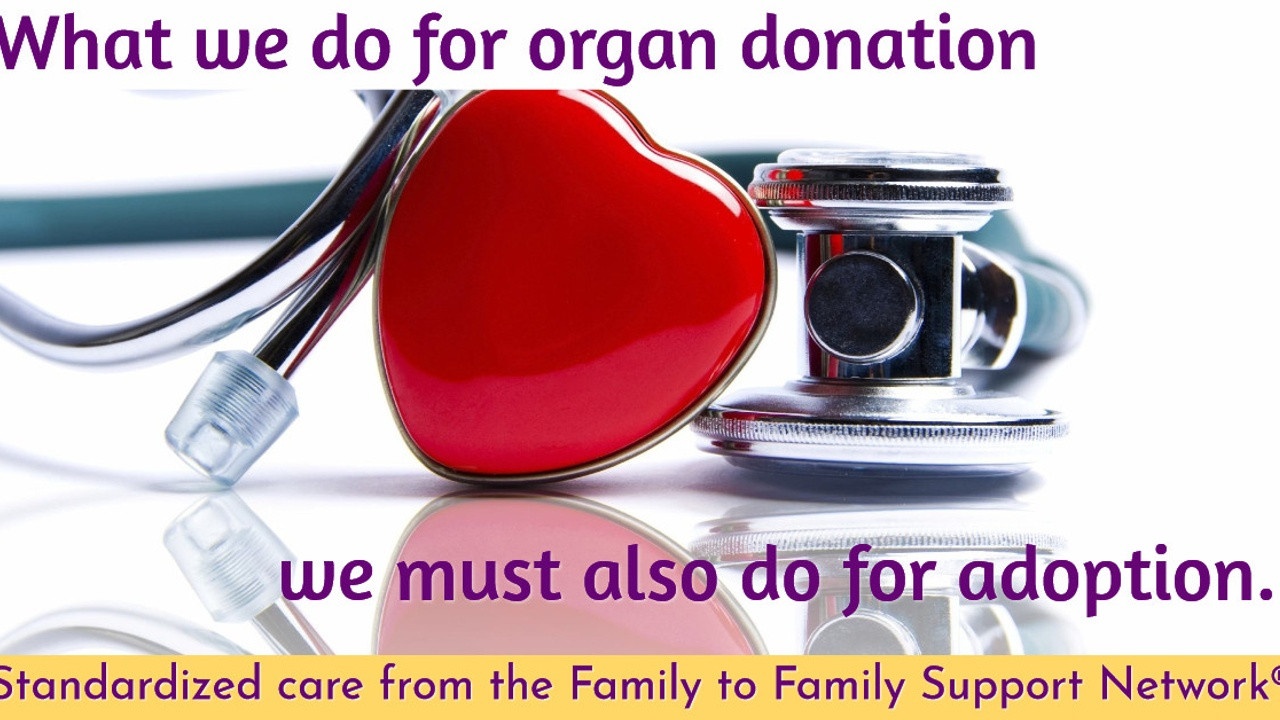Why for Kidneys But Not for Babies?
Aug 13, 2021
Summary: There are practices we don't tolerate with living kidney donation that we barely give any thought to in infant adoption.
Where do both of these scenarios unfold? In hospitals. Just like birthing centers can take cues from best practices in hospice care, they can also learn much from standard practices surrounding organ donation.
Why are Kidneys more important than Newborn Babies?
The question came up again. It is one that has haunted me for years. Why protect the transfer of kidneys, but not the transfer of babies. Babies (with all their organs) going from one family to another. Is it the impact of history? A lack of understanding as to what moms and dads go through when they decide to make an adoption plan? Lack of awareness as to the current chaotic state of infant adoption where families are advertising on Facebook and Craigslist, both to find a baby for their family or a family for their baby? The latest ad I saw was on Varage Sale. It was Nextdoor before that. What will it take for us as a country to really look into the practice of infant adoption and call out the corruption, and name those making millions in the industry, while encouraging those embracing ethical adoption practices, often to their financial detriment?
Maybe it will take a reframing. The infrastructure in place to try to keep people from selling their organs may be an obvious starting point to protect those involved in infant adoption.The lack of federal oversight and regulations for infant adoption would NEVER be acceptable to any of us if we applied those same regulations to organ donations.
Living kidney donation is a significant sacrifice. A sacrifice made by a person willing to give a kidney to another person to extend their life. There are many resources and regulations in place to protect the donor and the recipient, and the medical profession is in the middle of the transfer -- governed by standards and regulated with safeguards. There are so many laws in place that those who want to access a donated kidney outside these regulations are limited to transplant tourism, traveling to other countries to pay to access an “available” organ.
I can’t help but ask: what is in place for protection for those involved in the infant adoptions happening across our country? Let’s take a look at how pursuing a kidney donor would look if it were practiced like infant adoptions today. What can we learn from this comparison?
Would we allow those pursuing a kidney to use the same tactics being used to pursue adopting an infant?
Let’s say I am waiting for a kidney from a live donor, instead of waiting for a baby to adopt. I have been added to the donor waiting list in hopes of being chosen as a recipient of someone’s kidney. I have some decisions to make. Getting a kidney is all I can think about. I do the paperwork with a professional - and I wait.
I google “kidney donation” and find out there are (unlicensed) professionals that can get my story out there for a fee of about $5,000. I sign on with multiple marketers in hopes of getting in front of someone willing to choose me to receive their kidney. Some families are able to contract with multiple “professionals” and, while the price tag could climb above $100,000, they will get a kidney faster. Clearly, if I pay more, I can be on the internet with sponsored ads to hopefully get my kidney sooner.
I am also asked to fill out a checklist to say who I am willing to get a kidney from. Some professionals will structure my fees based on the color of the person donating - it will cost me more to get a kidney from a white person, than a person of color.
When I finally hear someone is considering giving me their kidney, I can start to pay them – in some states, medical expenses only, but in others, I may be asked to pay for their cell phone, rent, missed wages due to their health…and then they are expected to make a decision months later as to whether to actually decide to donate their kidney to me. The donor who decides to keep her kidney, may even be asked to pay back the funds she has received from me, or she may feel she no longer has a choice and must donate her kidney since she has taken the money offered for her expenses prior to her actual organ donation.
Now, I find that I can wait with an ethical professional, following ethical practices, but if I decide to do that, the wait for a kidney can go from months to years. While I wait for a kidney, I probably will eventually invest in the marketing needed to get my story out there to those considering donating a kidney. I’ll consider where to advertise for a kidney based on which states allow me to market my situation. I will be encouraged to “find my own donor” by networking with everyone I know - I’ll post on Facebook, Instagram, YouTube, make a website explaining how much I need a kidney and why I am worthy of your kidney. I could leave business cards in healthcare offices hoping to be the one called should a kidney become available. I can buy ads on Facebook and fundraise for my kidney transplant, all while hoping my marketing dollars are being put to good use with the multiple (unlicensed) professionals I have hired to find me a kidney.
Sounds horrible, doesn’t it? Yet, with little to no oversight, this is how infant adoption is currently being practiced. The internet has changed everything. It has been estimated that there are up to 1 million families hoping to adopt a newborn, and there are currently only approximately 18,000 infant adoptions a year. The supply and demand of infants is driving up the price creating a huge market – and a huge opportunity to make money in the “match.com” internet landscape. One in eight couples are facing infertility and the desire to be parents is a lucrative quest for unlicensed professionals preying on these families and mothers considering adoption. There are absolutely ethical adoption professionals out there, but they can often not even do “choice counseling” with expectant moms considering adoption because their choice has already been made by “finding a family” on the internet and checks have already been written.
Have you ever wondered why people aren’t allowed to facilitate their own kidney donations? When and where were the living organ donations expectations defined? Clearly, at some point those realizing the impact of medical advances knew they had to set guardrails in place to protect the donors and the recipients. But since infant adoption has been done for centuries, I believe its presence has become an unaddressed, unregulated fixture in our society, because it just has “always just been.”
So if we all can agree regulations and oversight needs to happen, who is going to do it?
Who is going to step up and ensure that unlicensed professionals are reigned in, if not completely removed from the infant adoption industry? Who is going to ensure that expectations are set? If healthcare and our government created structures around organ donation, why are they not also funding an empowering infrastructure addressing domestic infant adoption to protect all involved?
Who is battling against regulation and oversight for domestic infant adoption?
So many questions and so many of us searching for answers. My colleague, Lori Holden explores this comparison on LavenderLuz.com and both of us hope you will add your voice to ours. Stay informed of our quest to pursue adoption reform by adding your information here. Those who follow my work won’t be surprised that I look to healthcare to aid in oversight. I look at the government funding that creates ethical infrastructure for kidney donation and would hope there would be funding for similar resources, laws and regulations for the transfer of infants.
Shouldn’t we have at least the same amount, if not more concern, for an infant with all their organs than a donated kidney?

